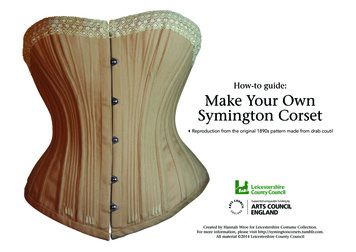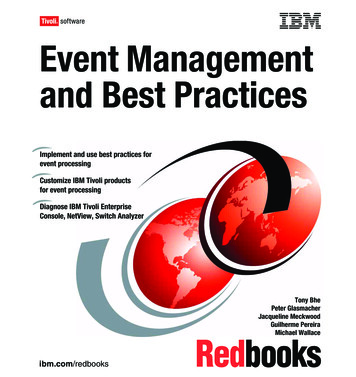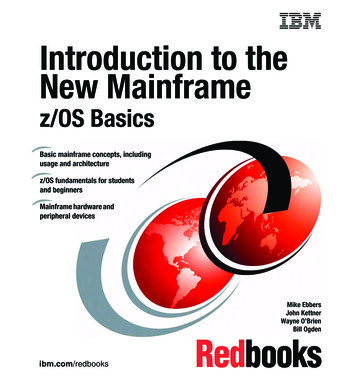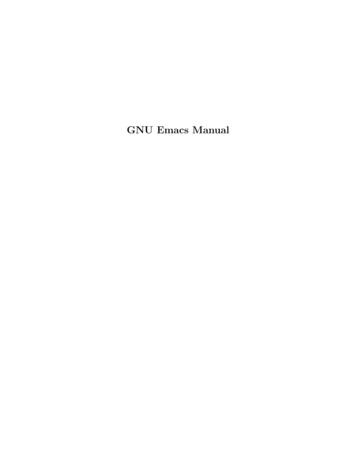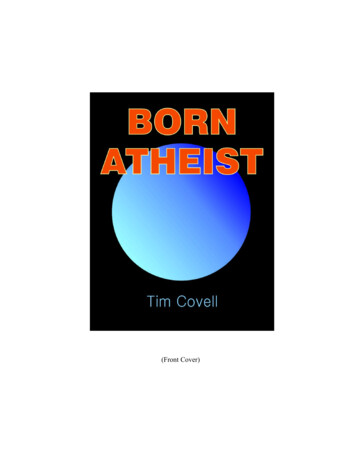
Transcription
(Front Cover)
(Back Cover)
BORN ATHEISTTim CovellISBN: 978-1-4502-6753-3ISBN: 978-1-4502-6752-6 (ebook)For updates and additional resources, visit:BornAtheist.comAll rights reserved 2010Permission is hereby granted to atheist groups, atheist Websites, atheist individuals andlegitimate news and/or educational media to reprint, redistribute or excerpt up to 30 pages oftext and any original figures and/or artwork, including the “Born Atheist fish” and “surfingdino,” for review, analysis, comparison, education or any other non-money generating purpose.Credit to the author and/or BornAtheist.com is appreciated.All Biblical quotes are from the New International Version, unless otherwisenoted. Scripture taken from the HOLY BIBLE, NEW INTERNATIONALVERSION . Copyright 1973, 1978, 1984 Biblica. Used by permission ofZondervan. All rights reserved.The “NIV” and “New International Version” trademarks are registered in theUnited States Patent and Trademark Office by Biblica. Use of eithertrademark requires the permission of Biblica.
With fond memories of my mother,whose independence, intelligence and frustrationbecome clearer with each passing year.
TABLE OF CONTENTSPreface. . . . . . . . . . . . . . . . . . . . . . . . . . . . . . . . . . . . . . . . . . . . . . . 1Chapter 1. Born atheist. . . . . . . . . . . . . . . . . . . . . . . . . . . . . . . . . . . 7Chapter 2. Religion is powerful. . . . . . . . . . . . . . . . . . . . . . . . . . . . 9Chapter 3. Who acts like they are right?. . . . . . . . . . . . . . . . . . . . 16Chapter 4. Who are those guys?. . . . . . . . . . . . . . . . . . . . . . . . . . . 20Chapter 5. Names and symbols. . . . . . . . . . . . . . . . . . . . . . . . . . . 28Chapter 6. Atheism is neither a religionnor the opposite of religion. . . . . . . . . . . . . . . . . . . . . . 40Chapter 7. Who gave them the moral high ground?. . . . . . . . . . . . 47Chapter 8. Mormonism: religion is the strangest fiction. . . . . . . . 61Chapter 9. The people of the book. . . . . . . . . . . . . . . . . . . . . . . . . 73Chapter 10. The scriptures–written by men and fixed in time. . . . 77Chapter 11. Small miracles. . . . . . . . . . . . . . . . . . . . . . . . . . . . . . . 84Chapter 12. Jesus rising. . . . . . . . . . . . . . . . . . . . . . . . . . . . . . . . . 90Chapter 13. No good dogs go to heaven. . . . . . . . . . . . . . . . . . . . . 93Chapter 14. Religion, health and the environment. . . . . . . . . . . . . 96Chapter 15. Women. . . . . . . . . . . . . . . . . . . . . . . . . . . . . . . . . . . 104Chapter 16. Sexuality. . . . . . . . . . . . . . . . . . . . . . . . . . . . . . . . . . 113
Chapter 17. Faith in action: the ballad of Ted Haggard. . . . . . . . 122Chapter 18. Gays and religion. . . . . . . . . . . . . . . . . . . . . . . . . . . . 128Chapter 19. Art to die for. . . . . . . . . . . . . . . . . . . . . . . . . . . . . . . 138Chapter 20. Religion and lies: necessarily intertwined. . . . . . . . . 145Chapter 21. Superlegal actions. . . . . . . . . . . . . . . . . . . . . . . . . . . 153Chapter 22. The end times. . . . . . . . . . . . . . . . . . . . . . . . . . . . . . . 169Chapter 23. How deep is your love?. . . . . . . . . . . . . . . . . . . . . . . 178Chapter 24. Darwin should have done it. . . . . . . . . . . . . . . . . . . 185Chapter 25. Atheists have an image problem. . . . . . . . . . . . . . . . 196Chapter 26. Learning from the gay rights movement. . . . . . . . . . 205Chapter 27. Atheist action. . . . . . . . . . . . . . . . . . . . . . . . . . . . . . . 212Conclusion. . . . . . . . . . . . . . . . . . . . . . . . . . . . . . . . . . . . . . . . . . . 227
Preface.Like everyone, I was born atheist. Like many atheists,1 I wasraised without religion. Although my parents sent me to Sunday School,they never asked me to believe. Until I started reading about atheism,I could not understand why five out of six of my siblings are atheists.But rating myself on a scale of religious emphasis in the home showedthe answer--there was no religious emphasis in my childhood home.My parents did not attend church. Neither god nor religion wasmentioned in our home. There was a Bible2 around somewhere, but itwas not considered a reference book, even less a spiritual guide.At around 11 years of age, I challenged my mother’srequirement that I attend Sunday School. I presented usual childhoodissues like “if god created the universe, what created god,” and I toldher I did not believe in god. My mother’s answer surprised me, shesaid, “we are not asking you to believe, we only want you to attend tolearn background that may be useful later in your life.” Her answersatisfied my young mind and I attended Sunday School for another yearor two, but I never believed.As I grew up, I assumed everyone was atheist. I knew religionexisted, but it was not something that I, my family, or my friends caredabout. When I was in college, peers occasionally commented, “you arethe first atheist I have met.” I thought it was odd for them to say this,but I did not think much more about it.As a young man, my view of religion was mildly positive. Iknew that religious people had some beliefs different from mine, but Ithought, all and all, their thoughts and values were harmless.Additionally, I observed that religions often had charitablefunctions–running hospitals, providing shelter to the homeless, raising1
BORN ATHEISTfunds for victims of flood and famine. I think that was where my mildlyfavorable impression came from.I also theorized that religion provided an external value systemfor people whose internal value system failed. I knew that alcoholics,drug addicts and criminals attested that they turned their lives aroundwhen they “found” religion.Not so many years ago, I bought a used car with a Jesus fish onit, a fish-shaped chrome emblem of the Christian faith. I left the fishthere as a joke--I thought it would be funny if others saw me asChristian. I did not find the fish offensive.I lived through the 1970’s when “Born Again” bumper stickersappeared on cars. I was a complete outside observer when I saw thereplies, for example a Star of David sticker with the text “born right thefirst time.” Religion was simply unimportant to me.But bumper stickers lead to a change in my thinking. Sometimeduring the George W. Bush administration I was sitting in trafficbehind an SUV plastered with bumper stickers. I have always thoughtof myself as a “live and let live” person. As long as another person’sconduct or beliefs do not interfere with my life, I have little concern. Igenerally do not think that I have answers that will make anotherperson’s life better and I like to associate with people who follow thesame philosophy.But the driver of the SUV ahead of me thought differently. Hewanted to require prayer in schools, outlaw abortion, teach creationisminstead of science, and deport immigrants. Not only did the driveradvise me of his opinions, he seemed to be willing to use violence toback them up. His stickers warned that “gun control means using bothhands,” and that his car was protected by a .357 Magnum. Readingthese stickers, it dawned on me that the driver did not share my valueof “live and let live,” in fact, the driver wanted to force me to live likehim!Around the same time, the world experienced an eye-opener,religious extremists crashing airplanes into the Pentagon and the World2
BORN ATHEISTTrade Center. Although the media downplayed it at the time, religionplayed a key role in the attacks.The aftermath of 9/11 surprised me. Within 18 months, theUnited States attacked Iraq, a county with no link to 9/11. The sameSUVs that displayed Jesus fish and W stickers began sporting pro-warribbons. People who protested the war were harassed and arrested. Itseemed the “religious right” was taking over the country.American religionists supported Bush with faith-like fervor asthe U.S. Government suspended the Constitution and spied on itscitizens, suspended the rule of law to imprison terrorist suspectswithout charge and ignored treaties to institute illegal policies of arrestand torture. American religionists consistently provided the strongestsupport for these actions. It seemed that Muslims and Christians wereengaging in a holy war and that truth, law and the U.S. Constitutionwere the first victims. The media followed the government line, neitherquestioning the changes nor examining the role religion played.More and more I saw religion imposing on my life. Using theirancient texts as guidance, the religious right sought a federalConstitutional Amendment to ban gay marriage starting in 2003. Statesput gay marriage bans on the ballot almost every year. The city next tomine started teaching creationism in the schools. Religious violencecontinued. Worldwide, religious terrorists attacked over and over again.And still the media ignored the role of religion in the killings.My youth was filled with the fear of conflict between a nucleararmed East–the Soviet Union, and a nuclear armed West, led by theUnited States. After the Berlin Wall fell, political conflict de-escalatedand I thought, “finally, there is an opportunity for peace in my time.”But horrifically, peace was not to be. The new area of conflict isreligion, not politics. Now the fear is that a nuclear armed India,Pakistan, Israel, Iran or U.S. might rely on religious lies to unleashweapons of mass destruction. Instead of building a safer world basedon our commonalities, we are building a more violent world based onancient myths. The more I looked, the more I saw religion as a negativeforce, a force behind much of the wrong in the world.3
BORN ATHEISTI have spent most of my free time for the past four years readingabout religion. The more I learn about religion, the more absurd its rolein modern life appears.In researching religion, I found many good resources. Readingthe authors critics label “new atheists,” presumably because they havethe backbone to denounce religion, several points made sense to me:1.2.3.4.5.Religion gets more respect than it deserves;The good that religion can accomplish is easily duplicatedwithout religious baggage;Religious moderates, as benign as they might seem, support thestructure that empowers religious radicals;Religion is a lie; and,In a world where religious radicals are willing to use guns,explosives, planes and nuclear weapons based on their religiousmyths, religion is an especially dangerous lie.Although the books I read made good points, the approach ofmany authors struck me as overly intellectual and inaccessible. I readabout things like “Occam’s razor.” And although I tried to understand,other than repeating the odd name, I cannot tell you what Occam’srazor is or why it might be important to me. When I see 30 pages ofdense text without a break, my eyes glaze over. So, I have written abook for regular people--people like me. This is a short book, withshort chapters. I try to avoid big words and intellectual discussions.I am writing this book to support existing or emerging atheists,to encourage agnostics to get off the fence and make a choice, and toencourage everyone on the religiosity scale described in Chapter 4 tomove one step to the left. I feel obligated to act. I do not understandwhy so few people are willing to speak the truth when religionists arekilling for their myths.Atheism is an immature movement. Although it is a potentiallypowerful force, I am distressed by its weakness. Ted Haggard’sNational Association of Evangelicals claimed 30 million members,4
BORN ATHEISTwhile the largest American atheist group has 14,000. Compared toreligion, atheism is disorganized, leaderless and powerless. Despitebeing right, atheism is neither taught nor promoted, it just sits therewaiting to be found. Prejudice against atheists abounds. Americansboast of respecting freedom of religion but they do not see that conceptas including freedom from religion. I hope to do what I can to changethis.I acknowledge up-front that I am not a professional journalist.I am not a professor of philosophy or biology. I do not write for aliving. I do not have a research staff, a professional editor or aproofreader. I am a regular guy, raised without religion, who has aparticular concern about religion. I have spent several years reading andthinking about religion, and I have something to say.5
SECTION I.Atheists: Who are those guys?
Chapter 1. Born atheist.All thinking men are atheists.3 Earnest HemingwayEveryone is born atheist. Religion is learned. As a learnedbehavior, peoples’ religion can be accurately predicted by the religionof their parents and the place where they live. Therefore it is no surprisethat 77% of Americans are Christian, 97% of Saudis are Muslim, 95%of Thais are Buddhist, 80% of Indians are Hindu and 85% of Swedeshave no religion.Religionists do not want to admit that everyone is born atheist.The statement infuriates them. Religionists want to deny the facts. Theycall this faith--persisting in believing something despite contrary facts.They act as if faith is a good thing. But it does not change the fact thateveryone is born atheist, religion is learned. Perhaps religionists fearthat if they admit religion is learned, people will realize that it can beunlearned.Atheists have no belief in god. Some atheists never learnedreligion. Others have unlearned religion. Literally, atheism means“without deities.” In this book, I use it slightly more broadly to mean“without religion.”Religion is generally characterized by 1.) believing in asupernatural god or gods, 2.) believing in life after death; and, 3.)following a “holy” book or “scripture” that is allegedly attributable totheir god or gods.Religion is man-made. Religion is not a divinely inspired truth,it is a product of family and society. If you were born in Saudi Arabia,you would most likely be Muslim. If you were born in Thailand, youwould most likely be Buddhist. There is no one great religious truth.Today, there are many religions and over the history of man, there have7
BORN ATHEISTbeen many more.4 If you follow a religion it is almost always the resultof the time, place and family into which you were born.Each religion claims to know the one true path. But they cannotall be right. To accept one religion means denying the others. Forexample, a Christian finds the religious assertions of a Muslim silly oreven dangerous. The Christian has no belief in the Muslim god. TheChristian has no belief in the Muslim scriptures. The Christian is anatheist when it comes to Islam. Each religious person is effectively anatheist in the remainder of the world’s religions. This book asks thereligious person, why not add one more?The atheist has nothing to prove.As an atheist, I have no belief in god--not in the Jewish god, notin the Christian god, not in the Muslim god and not in the Hindu gods.When comparing myself to a religionist, I like to picture each of usholding an old mayonnaise jar. Perhaps when you were a child youpoked a few holes in the lid of a mayonnaise jar and collected insectsfor observation. But in this instance, instead of putting insects in the jar,picture it full of religious beliefs.The religionist’s jar contains all of the beliefs of his religion.For example, a Catholic’s jar would include heaven and hell, a beardedman in the sky and his human son, virgin birth, walking on water,people rising from the dead, saints, miracles and the Pope as theinfallible spokesperson for god.My jar is empty.Often religionists feel atheists should prove there is no god.Perhaps because they have been in power for so long, they think theycan set the terms of the debate. But atheists have no belief in god. Myjar is empty. I have nothing to prove. All of the shouting in the worldwill not change this fact. It is the religionist who has a jar full of beliefs.And the religionist lacks facts to support his beliefs. So he labels themfaith. Religion requires faith because it has no facts.8
Chapter 2. Religion is powerful.Religion is the world’s most powerful institution.5In fact, very little is known in social science about the economicoperation of religious institutions. The entire subject has been largelycloaked in secrecy by the religious groups themselves and avoided bypolite journalists and researchers.6 Authors John Heinerman andAnson Shupe[T]he inability to believe in God and to live by faith is the greatest ofevils.7 Catholic Cardinal Murphy-O’ConnorReligionists act as if they are a vulnerable minority under attackby atheists. But look where the power lies. Have you heard of an atheistcity, with its own police force and army? There is none. But certainlyyou have heard of the Vatican City, a city-state in Italy ruled by thePope, complete with police, soldiers and a 356 million annual budget.8Every American President since Eisenhower has met with the sittingPope.9 But politicians’ obsequiousness is not limited to Catholics. Mostrecent American Presidents have met with the Dalai Lama, a Buddhistmonk believed to be an earthly incarnation of a Bodhisattva.10 Duringthe 2008 American presidential campaign, each candidate appeared atpreacher Rick Warren’s church.11 Each candidate professed hisChristianity and the winner, Barack Obama, invited Warren to delivera religious invocation at his inauguration.12Money is a measure of power. As the second quote at the startof this chapter notes, there is very little research about the amount ofmoney religious institutions collect and control. In the U.S., religionsare exempt from reporting to the Internal Revenue Service. Rick9
BORN ATHEISTWarren’s church discloses that it has an annual budget of 30 millionand 400 employees.13 The Charity Navigator Website reports that in2007 Americans donated an estimated 300 billion to charity, with thelargest portion going to the 350,000 American churches.14 “GivingUSA” estimates that Americans donated more than 106 billion toreligious groups in 2008,15 about 400 per religious person in theUnited States. The total worth of these organizations, which have beenaround for years, is unknown. No government agency collects theinformation, the media does not inquire, and the churches do not revealit. But with an annual income of 100 billion and years to gatherassets, the figure would be astonishing.The power of religion is not limited to money, religionists alsohave manpower. Just take a look around your neighborhood. A “googlemaps” search shows there are 12 churches within one mile of my home.Each has an impressive building and most have several full-timeemployees. If you live in a small town, you will likely find the house ofworship sitting in the most impressive building in town and located onthe nicest piece of land. If each of the 350,000 churches in the UnitedStates has just three employees, there are more than a millionAmericans working full-time on religious practices. When you add thenumber of religious volunteers, and estimate the number of religiousadherents who are willing to act on directives from their church, thenumbers are even more staggering. Think of how many people you seewith crosses around their necks, religious tattoos on their bodies, fisheson their cars, or talismans dangling from their rearview mirrors. Eachdemonstrates at least enough dedication to his religion to advertise it tothe world. At least 245 million Americans describe themselves asreligious,16 only about 2.15 million call themselves atheists.17The number of people employed by religion today is impressive,but not new. For thousands of years religion has dominated society. Itis little wonder that religionists are expert at indoctrinating children intotheir system. Religion applies its rituals days after birth, and stays in itsmembers’ lives through childhood, adolescence, marriage and death.10
BORN ATHEISTReligion controls more than money and manpower. There areabout 1,600 religious television and radio stations in the US, accessedby 141 million Americans monthly.18 Each major American religionruns countless religious schools. Catholics alone run 7,500 schools withan enrollment of 2.3 million students.19 The U.S. has about 900religiously affiliated universities.20 Numerous divinity schools andseminaries teach religionists how to promote their cause to the generalpopulation. The commercial media, which earns its living pleasing thegeneral population, never steps too far from the religious agenda.Although history is full of conflicts between religions,religionists in the United States seem to be building an alliance–analliance against atheists. For example, while running for president, MittRomney, a Mormon (see Chapter 8 for more about Mormonism),sought to align himself with long established religions and against whathe called the “religion of secularism,” when he said:[I]n recent years, the notion of the separation of churchand state has been taken by some well beyond itsoriginal meaning. They seek to remove from the publicdomain any acknowledgment of God. Religion is seenas merely a private affair with no place in public life. Itis as if they are intent on establishing a new religion inAmerica--the religion of secularism. They are wrong. We are a nation ‘Under God’ and in God, we doindeed trust.[God] should remain on our currency, in our pledge, inthe teaching of our history, and during the holidayseason, nativity scenes and menorahs should bewelcome in our public places. Our greatness would notlong endure without judges who respect the foundationof faith upon which our constitution rests. I will takecare to separate the affairs of government from any11
BORN ATHEISTreligion, but I will not separate us from “the God whogave us liberty.”Nor would I separate us from our religious heritage.Perhaps the most important question to ask a person offaith who seeks a political office, is this: does he sharethese American values: the equality of human kind, theobligation to serve one another, and a steadfastcommitment to liberty?They are not unique to any one denomination. Theybelong to the great moral inheritance we hold incommon. They are the firm ground on which Americansof different faiths meet and stand as a nation, united.21The religious alliance has succeeded to a great degree. Although65% of Americans believe that more than one faith can lead to eternallife,22 an amazing 57% think that belief in a god is necessary for aperson to be moral.23 Religionists have done a great job creatingprejudice against atheists. A now famous Gallup poll reports that inchoosing an otherwise well-qualified presidential candidate:94% of Americans would vote for a Black,92% would vote for a Jew,88% would vote for a female,72% would vote for a Mormon,55% would vote for a homosexual, but only45% would vote for an atheist.24A 2006 study shows Americans ranked atheists at the absolutebottom of a list of minorities including Muslims, gays, Hispanics, Jews,immigrants and racial minorities. Just a few years after the religiouslymotivated 9/11 attacks, Americans ranked Muslims more highly thanatheists! The report noted that while Americans have become much12
BORN ATHEISTmore accepting of other racial and religious minorities over the past 40years, attitudes toward atheists have hardly changed.25American politicians have learned this well. While there are 535members of Congress, only one, California Democratic RepresentativePeter Stark, is willing to acknowledge that although he attends aUnitarian Church, he does not believe in a supreme being.26 In fact, theconstitutions of nine states contain provisions similar to this one fromArkansas, “No person who denies the being of a God shall hold anyoffice in the civil departments of this State, nor be competent to testifyas a witness in any court.”27Religionists have asserted their political power in Congress.Religionists succeeded in putting “in god we trust” on the one cent coinin 1864. They prevailed in adopting “in god we trust” as the nationalmotto of the United States in 1956, and starting in 1957 the phrasebegan appearing on paper money. It completed its spread to all papermoney by 1966.28Similarly, in the 1950’s a Catholic men’s group called theKnights of Columbus endeavored to add the phrase “under god” to thePledge of Allegiance. They gained the support of President DwightEisenhower who heard a sermon that said, “Apart from the mention ofthe phrase ‘the United States of America,’ . . . [the Pledge ofAllegiance] could be the pledge of any republic. In fact, I could hearlittle Muscovites repeat a similar pledge to their hammer-and-sickleflag in Moscow.” The sponsor of the resolution said, “An atheisticAmerican . . . is a contradiction in terms.”29 Congress passed a jointresolution changing the Pledge and Eisenhower signed it stating, “Fromthis day forward, the millions of our schoolchildren will daily proclaimin every city and town, every village and rural schoolhouse, thededication of our nation and our people to the Almighty.”30Religionists recently became upset when the new 612 millionCapitol Visitor’s Center did not include the motto “in god we trust” inits architecture. By a vote of 410 to 8, the House of Representativesapproved making a costly change to put the words on the building.3113
BORN ATHEISTPoliticians follow the lead of their religious supporters andfreely disparage atheists. When a reporter for American Atheists askedVice President (and presidential candidate) George Herbert WalkerBush, “Surely you recognize the equal citizenship and patriotism ofAmericans who are atheists?” Bush replied, “No, I don’t know thatatheists should be considered as citizens, nor should they be consideredpatriots. This is one nation under God.” When the American Atheistsorganization wrote to every member of Congress asking that the newlyelected President Bush be censured for his statement, not one memberof Congress replied.32Politicians return the favor to religionists for their support. In2008, “born again Christian” President George W. Bush departed andBarack Obama came in with the motto, “change we can believe in.” Butin fact, Obama has both increased funding to religious organizationsthrough his “faith-based initiatives” and invoked Jesus more in hisspeeches than former President George W. Bush.33Roman philosopher Seneca the Younger said, “Religion isregarded by the common people as true, by the wise as false, and byrulers as useful.” Politicians are acutely aware of the power of religionand cater to the wishes of religionists to stay in power.The power of religion extends beyond money, manpower,political power and media control. Religion has woven itself into thefabric of our society. Religion permeates our lives. Many of our namescome from the Torah or Bible. Think of how many people you knownamed David, Mark, John, Mary, Sarah or Deborah. Each time you calltheir names you make a biblical reference. Circumcision, a Jewish,Muslim and partially Christian rite is still practiced widely in theUnited States. We use phrases like “thank god,” and “bless you,” withcareless regularity. Our legal system is based on the religious conceptsof choice and free will. Religion pervades our thoughts and languagein ways it is impossible to measure. Religion’s tentacles spread throughour art, music, laws and government. Religionists like to pretend theyare under attack by secular America, but the religionists roost in a placeof power and are firmly in control.14
BORN ATHEISTReligion is the world’s most powerful institution. It has money,manpower, media, politicians on a leash and devoted adherents whowill go so far as to kill on religious orders. I emphasize this for tworeasons. First, religion is firmly entrenched in a position of power. It isable to set the terms of the debate between religionists and atheists.Second, one must wonder why religion is so afraid of a small,disorganized and despised minority like atheists? Religionists act verymuch as if they are aware that atheists are right. The next chapterexamines who acts like they are right by looking at how each grouptreats its members who quit.15
Chapter 3. Who acts like they are right?A faith that cannot survive collision with the truth is not worth manyregrets.34 Arthur ClarkeA useful perspective on the difference between atheism andreligion is found by looking at how each group treats its members whoquit. Religionists act like a crime syndicate when members quit.Religionists have a special term for those who quit--apostates.“Apostate” is not a term people apply to themselves, it is a terminsiders use to label outsiders. The reaction ranges from shunning theapostate, to murder.Religious scriptures provide stiff penalties for quitting. They area carryover from a time when religion and government freely mixed.Some theocracies maintain the strict penalties to this day.The Muslim approach to apostasy remains truest to itsscriptures. The Koran says, “They wish that you reject Faith, as theyhave rejected Faith, and thus that you all become equal[,] like oneanother. So take not . . . protectors or friends from them, till theyemigrate in the Way of Allah. . . . But if they turn back from Islam,take hold of them and kill them wherever you find them.”35The Website Jihad Watch, quoting a paper by scholar IbnWarraq,36 notes that only two countries, Sudan and Mauritania,specifically criminalize apostasy:[In Sudan,] . . . [w]hoever is guilty of apostasy is invitedto repent over a period to be determined by the tribunal.If he persists in his apostasy and was not recentlyconverted to Islam, he will be put to death. [InMauritania,] . . . all Muslims guilty of apostasy, either16
BORN ATHEISTspoken or by overt action will be asked to repent duringa period of three days. If he does not repent during thisperiod, he is condemned to death as an apostate, and hisbelongings confiscated by the State Treasury. Thisapplies equally to women
Permission is hereby granted to atheist groups, atheist Websites, atheist individuals and legitimate news and/or educational media to reprint, redistribute or excerpt up to 30 pages of text and any original figures and/or artwork, includ






